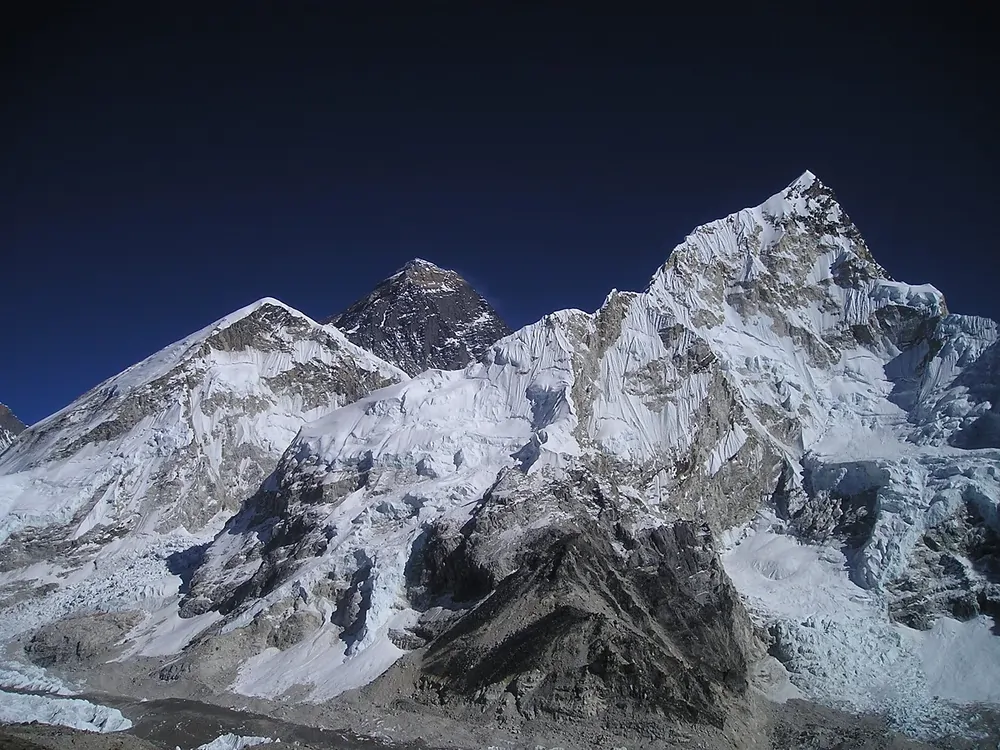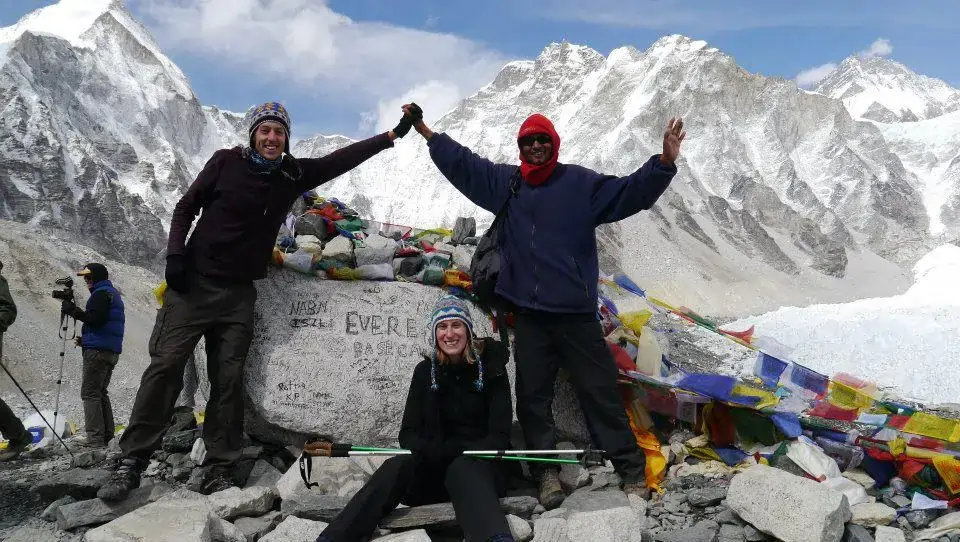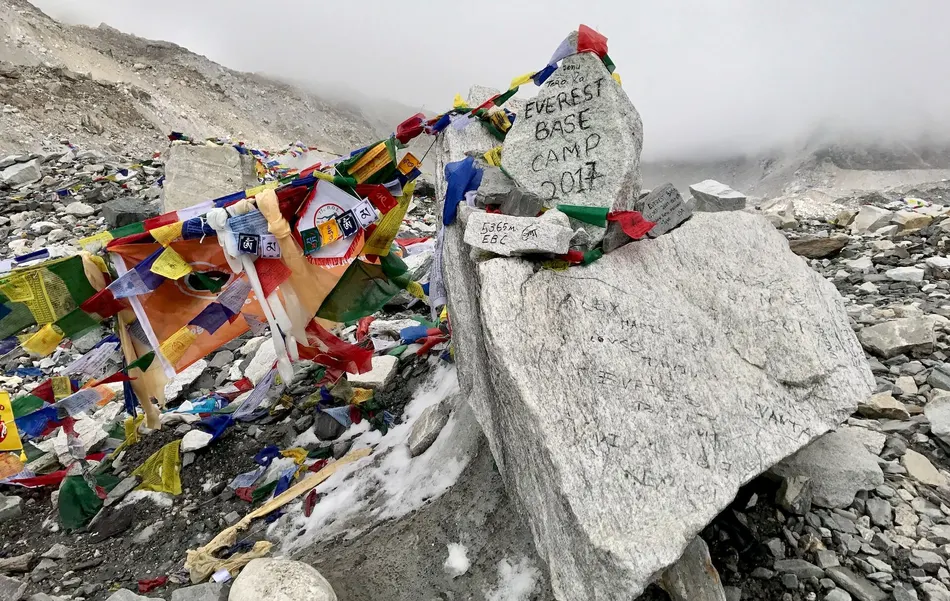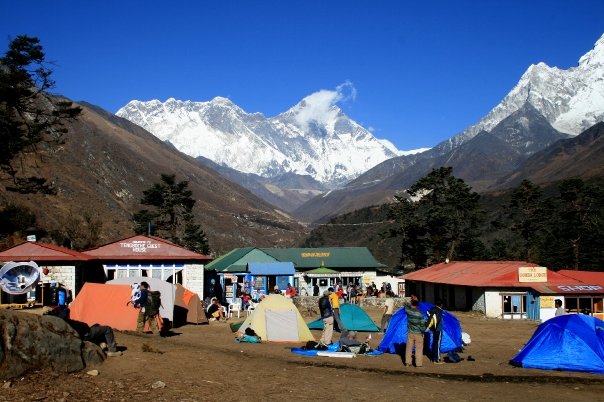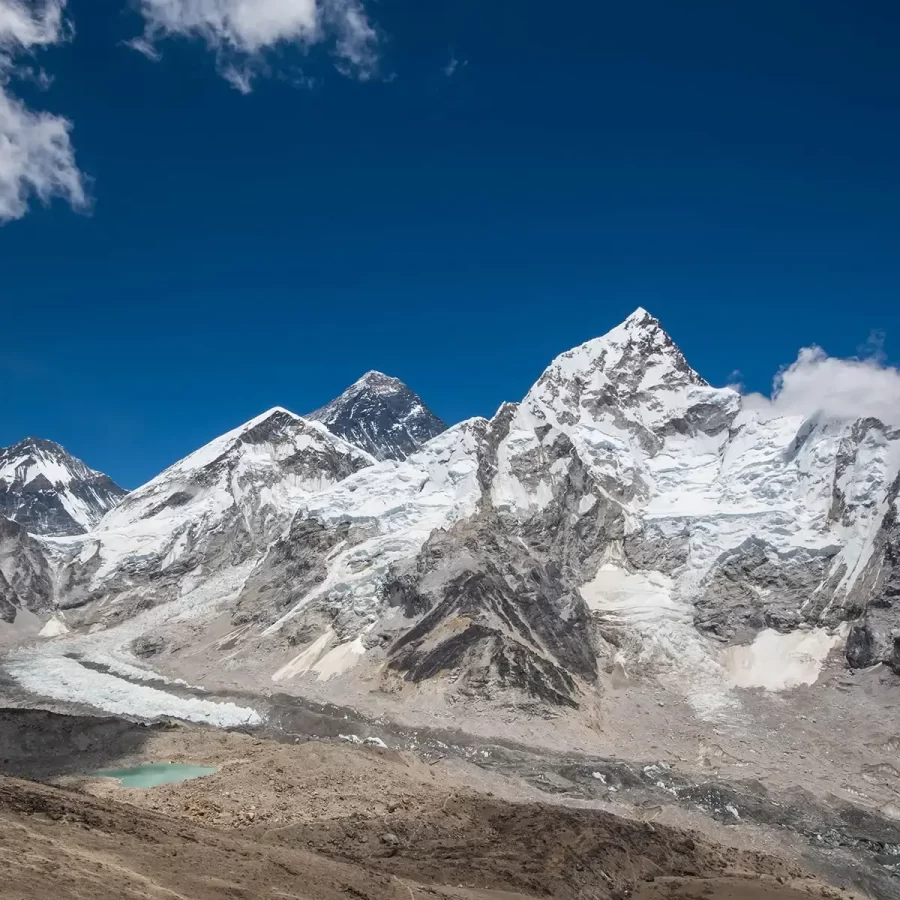Overview
Nepal is a special country surrounded by wonders of nature and splendors of culture, enveloped by the grandeurs of mountains. The trek that truly captures this essence of Nepal is The Everest Base Camp Trek (5545m). The EBC trek is what a lot of people dream to conquer once in their life. To leave footprints at the base camp of the world’s tallest mountain is a great ambition and an even greater holiday plan. Together with the brave Sherpa people and their culture, experience what our Sagarmatha has to offer.
During the trek, you will be able to see magnificent Himalayan ranges (Ama Dablam, Lhotse, etc.), explore the flora and fauna in Sagarmatha National Park, and witness moving glacier in the Khumbu region. The journey offers a once-in-a-lifetime opportunity to immerse oneself in local culture while also witnessing breathtaking scenery. It’s an adventure that tests your limits while rewarding you with a sense of awe, resilience, and connection to nature that few other adventures can provide. Trekking to Everest Base Camp is an absolute must for any adventurer looking for a life-changing and unforgettable experience.
Trip Highlights
- Relish the mountain flight journey from Kathmandu to Lukla
- View of two of the 14 mountains over 8000m (Mt. Everest - 8,848m and Lhotse - 8,516m)
- Journey to the foots of the highest mountain in the world (Mt Everest - 8848m)
- Trek along the highest human settlements of Khumbu and walk through the Sagarmatha National Park
- Visit the world's highest city of Namche Bazaar and other establishments in the region
- Get an opportunity to climb the Kalapathar viewpoint (5,545m)
- Meet the brave Sherpas dubbed the "snow leopards" of the Himalayas
Trip Itinerary
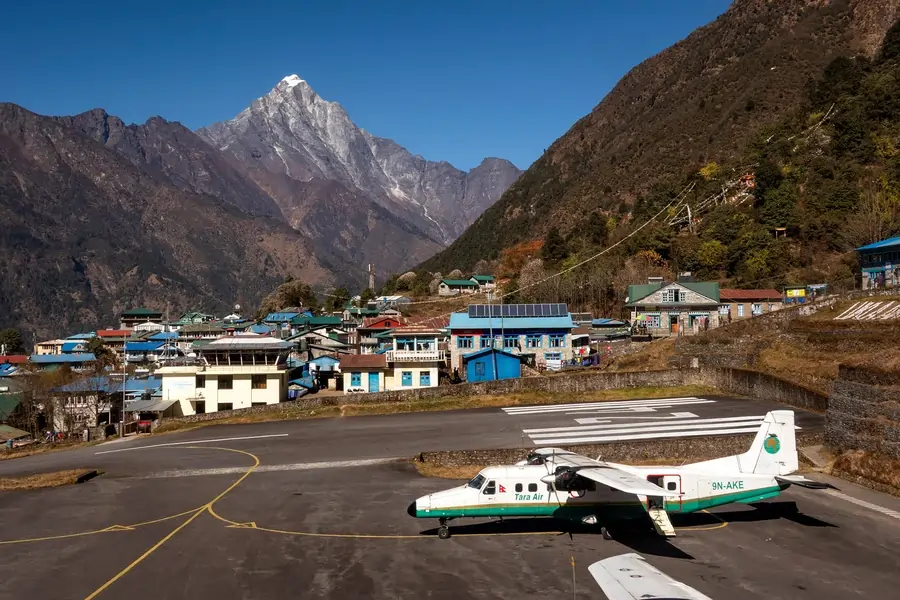 Lukla airport
Usually, the flight to Lukla is scheduled in the morning. We will pick you up from your hotel early in the morning to the domestic Airport of Kathmandu. A short flight of about 45 minutes will bring you to PasangLhamu Airport at Lukla (2,850 m).
We will then have a small breakfast in Lukla. From there, our trekking journey will begin, trekking through some beautiful settlements which connects to the main trail in Churi Kharka. We follow the east bank of the Dudh Koshi (the River of Milk) where we will witness the terrace culture in Nepal with slate roofed houses and dazzling views on Kusum Kangaru (5,579 m). The destination for today is Phakding (2640 m) which we will reach after a gentle 3 to 4 hours of walking.
Lukla airport
Usually, the flight to Lukla is scheduled in the morning. We will pick you up from your hotel early in the morning to the domestic Airport of Kathmandu. A short flight of about 45 minutes will bring you to PasangLhamu Airport at Lukla (2,850 m).
We will then have a small breakfast in Lukla. From there, our trekking journey will begin, trekking through some beautiful settlements which connects to the main trail in Churi Kharka. We follow the east bank of the Dudh Koshi (the River of Milk) where we will witness the terrace culture in Nepal with slate roofed houses and dazzling views on Kusum Kangaru (5,579 m). The destination for today is Phakding (2640 m) which we will reach after a gentle 3 to 4 hours of walking. 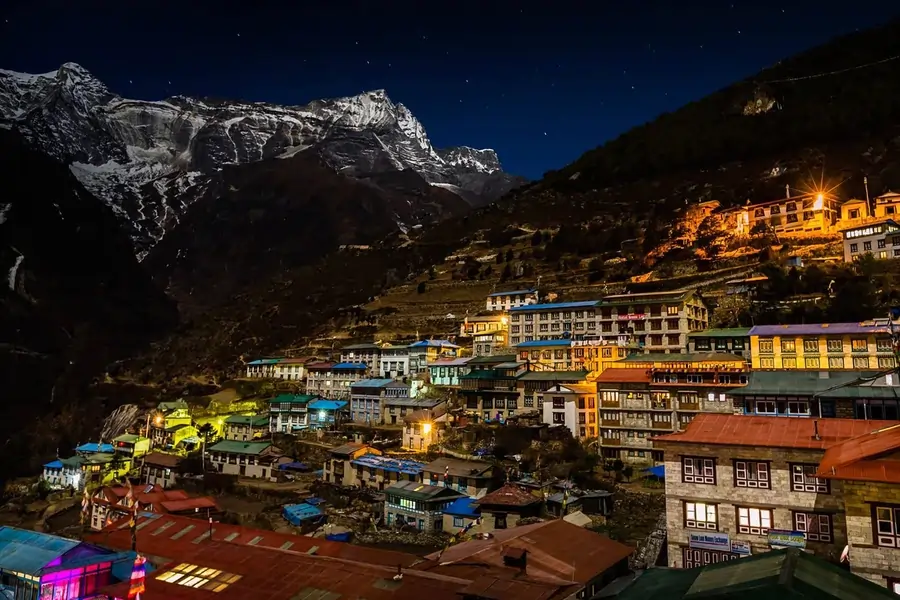 Namche Bazaar
After breakfast, we will hit the trail early and head towards Namche Bazaar. Upon leaving Phakding village, the trek continues on the bank of Dudh Koshi River. This part of the trail largely lies under the shades of a pine forest and crosses several yak pastures and Sherpa villages, namely Benkar and Chumoa.
Along the route, we will cross a long steel suspension bridge — The Hillary Bridge — to enter the Sagarmatha National Park at Monjo. Once we enter the national park, the trail becomes very steep, going uphill towards Jorsalle village. However, after a while, the strenuous trail will treat you to the marvelous view of Thamserku, Everest, Nuptse, and Kusum Kanguru.
As we continue climbing along the steep uphill trail, we will arrive at Namche Bazaar. Often regarded as the Gateway to the Himalayas, Namche Bazaar is surrounded by hotels, teahouses, restaurants, cafes, and colorful markets. From the village, we will have a close-up glimpse of Thamserku and Kongde-Ri.
Namche Bazaar
After breakfast, we will hit the trail early and head towards Namche Bazaar. Upon leaving Phakding village, the trek continues on the bank of Dudh Koshi River. This part of the trail largely lies under the shades of a pine forest and crosses several yak pastures and Sherpa villages, namely Benkar and Chumoa.
Along the route, we will cross a long steel suspension bridge — The Hillary Bridge — to enter the Sagarmatha National Park at Monjo. Once we enter the national park, the trail becomes very steep, going uphill towards Jorsalle village. However, after a while, the strenuous trail will treat you to the marvelous view of Thamserku, Everest, Nuptse, and Kusum Kanguru.
As we continue climbing along the steep uphill trail, we will arrive at Namche Bazaar. Often regarded as the Gateway to the Himalayas, Namche Bazaar is surrounded by hotels, teahouses, restaurants, cafes, and colorful markets. From the village, we will have a close-up glimpse of Thamserku and Kongde-Ri. 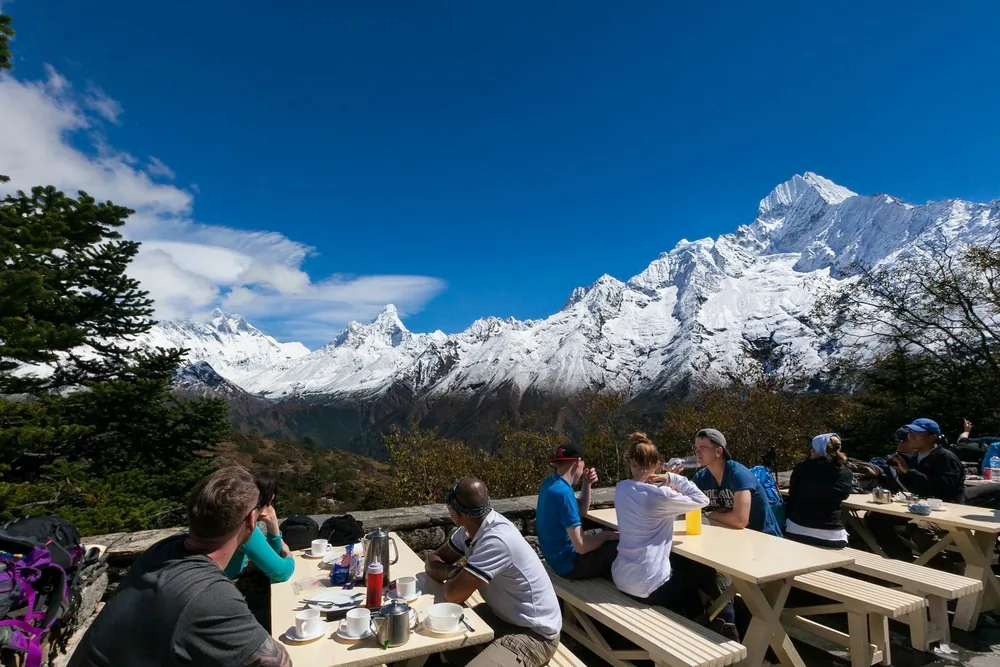 Everest View Hotel
The trek will take us above 4,000 meters over the next few days, so this day is very important for your body to adjust to the altitude in order to reduce the risk of altitude sickness. As it is a rest day today, you may hike shortly to the hills above Namche Bazaar, toward the settlement of Syangboche. Here, you will visit the Everest View Hotel — one of the world’s highest luxury hotels.
From the hotel’s sundeck, you can savor panoramic views of Ama Dablam, Thamserku, Mount Everest, Nuptse, Kwange, Kangtega, Lhotse, Taboche, and Khumbila. On your way back to Namche Bazaar, you will also have an opportunity to enjoy the Everest Photo Gallery and Sherpa Culture Museum.
Everest View Hotel
The trek will take us above 4,000 meters over the next few days, so this day is very important for your body to adjust to the altitude in order to reduce the risk of altitude sickness. As it is a rest day today, you may hike shortly to the hills above Namche Bazaar, toward the settlement of Syangboche. Here, you will visit the Everest View Hotel — one of the world’s highest luxury hotels.
From the hotel’s sundeck, you can savor panoramic views of Ama Dablam, Thamserku, Mount Everest, Nuptse, Kwange, Kangtega, Lhotse, Taboche, and Khumbila. On your way back to Namche Bazaar, you will also have an opportunity to enjoy the Everest Photo Gallery and Sherpa Culture Museum. 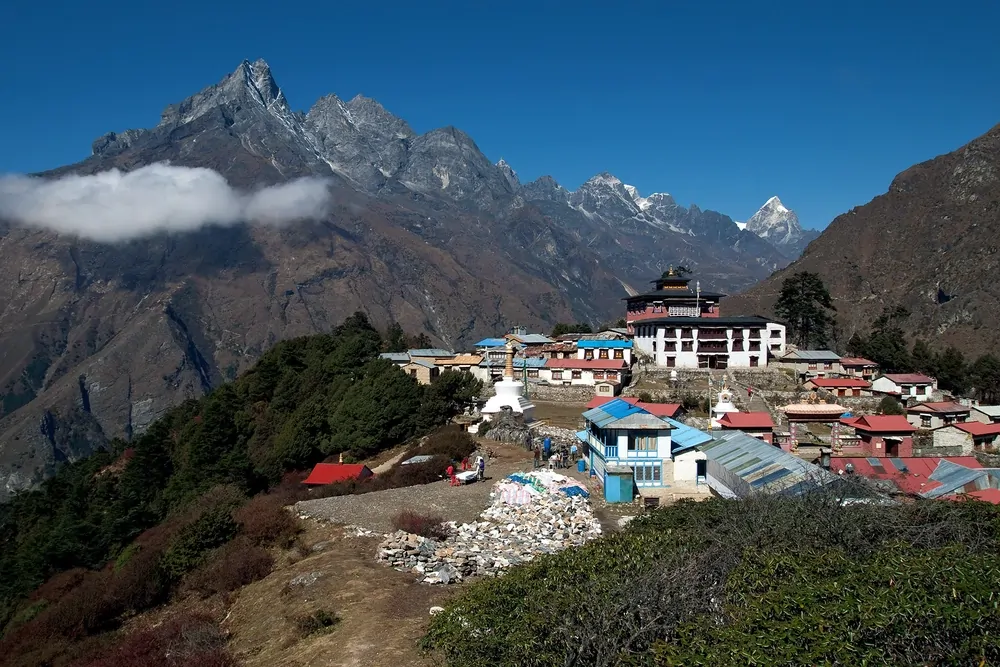 Tengboche Monastery
After our acclimatization day at Namche Bazaar, we will be greeted with an adventurous yet pleasant path. At this point, the trail passes through a dense rhododendron forest, with occasional Sherpa villages along the way. With marvelous mountain views in the background, this part of the trail is often regarded as the most scenic portion of the Everest Base Camp Trek. As we continue on your gradual walk along the hillside above the Dudh Koshi River, you will arrive at Phungithanga. Once we pass through Phungithanga, the pleasant route transforms into a more strenuous uphill walk.
We will cross the Imja Khola — a tributary of the Dudh Koshi River — under the shades of the rhododendron forest, and then arrive in Tengboche. Tengboche is a small Sherpa settlement scattered right below a crescent-shaped ridge. It is well-known for being the home of Khumbu’s largest Buddhist monastery — Tengboche Monastery. The sight from the front yard of the monastery is sublime. You can enjoy the close-up view of Ama Dablam along with the surrounding mountains, including Everest, Nuptse, and Lhotse from here.
Tengboche Monastery
After our acclimatization day at Namche Bazaar, we will be greeted with an adventurous yet pleasant path. At this point, the trail passes through a dense rhododendron forest, with occasional Sherpa villages along the way. With marvelous mountain views in the background, this part of the trail is often regarded as the most scenic portion of the Everest Base Camp Trek. As we continue on your gradual walk along the hillside above the Dudh Koshi River, you will arrive at Phungithanga. Once we pass through Phungithanga, the pleasant route transforms into a more strenuous uphill walk.
We will cross the Imja Khola — a tributary of the Dudh Koshi River — under the shades of the rhododendron forest, and then arrive in Tengboche. Tengboche is a small Sherpa settlement scattered right below a crescent-shaped ridge. It is well-known for being the home of Khumbu’s largest Buddhist monastery — Tengboche Monastery. The sight from the front yard of the monastery is sublime. You can enjoy the close-up view of Ama Dablam along with the surrounding mountains, including Everest, Nuptse, and Lhotse from here. 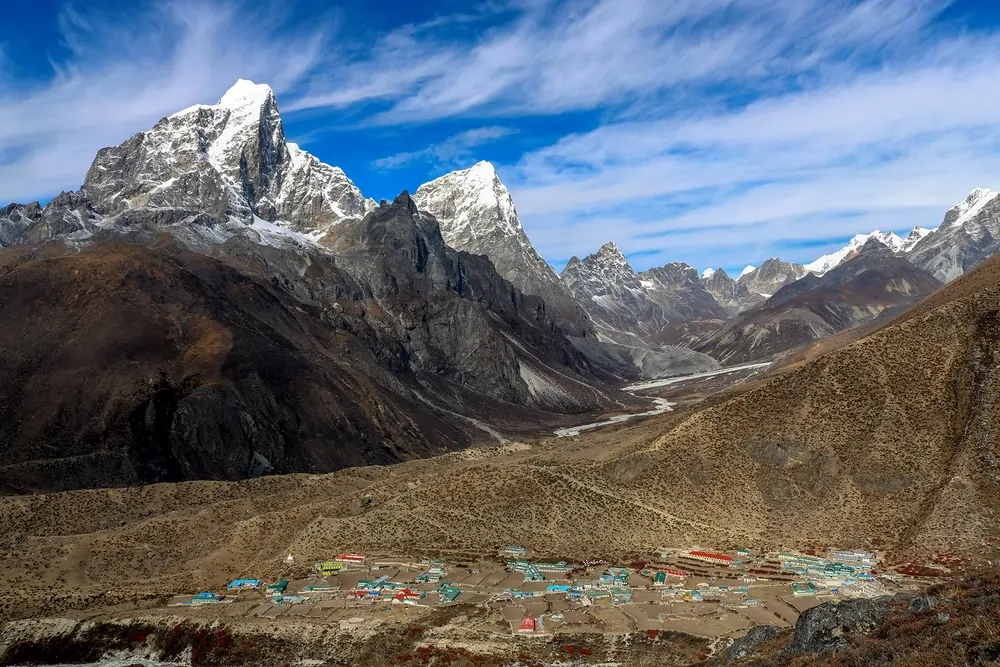 Dingboche
Today, get ready for a long trek to Dingboche. We recommend that you wake up early on this day to watch the sun rise over the beautiful Ama Dablam, as it is extraordinary, and you will be left in awe. After having a meal, the day walking will begin, and we will move north from Tengboche village.
After crossing a suspension bridge over the Imja Khola, the trail continues beside the hamlet of Pangboche village. From here on, the route becomes much narrower. The next village is Orsho, and here, we will take the lower route towards the bank of Imja Khola. There are many mani-walls, prayer flags, and chortens just before you arrive in Dingboche. Situated at 4,410 meters above sea level, Dingboche marks one of Khumbu’s highest Sherpa settlements. Hence, most trekkers begin to feel the effects of the high altitude at this point of the trek. Be sure to keep your body warm and stay hydrated to reduce the risk of falling ill.
Dingboche
Today, get ready for a long trek to Dingboche. We recommend that you wake up early on this day to watch the sun rise over the beautiful Ama Dablam, as it is extraordinary, and you will be left in awe. After having a meal, the day walking will begin, and we will move north from Tengboche village.
After crossing a suspension bridge over the Imja Khola, the trail continues beside the hamlet of Pangboche village. From here on, the route becomes much narrower. The next village is Orsho, and here, we will take the lower route towards the bank of Imja Khola. There are many mani-walls, prayer flags, and chortens just before you arrive in Dingboche. Situated at 4,410 meters above sea level, Dingboche marks one of Khumbu’s highest Sherpa settlements. Hence, most trekkers begin to feel the effects of the high altitude at this point of the trek. Be sure to keep your body warm and stay hydrated to reduce the risk of falling ill. 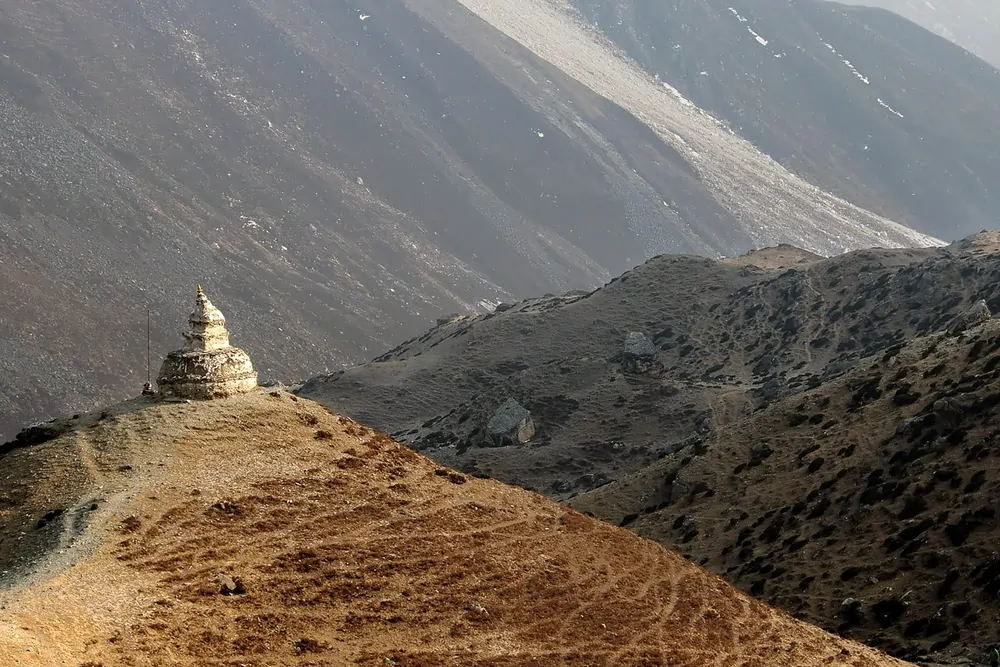 Dingboche Stupa
Due to the high altitude, today is yet another rest and acclimatization day to help your body adjust. However, we will still take a short hike to a nearby hill to feel active and ready for the remainder of the trek. While it is a steep ascent from Dingboche to the summit of Nagarjun Hill (located at 5,100 meters), the peak offers beautiful views of Ama Dablam, Lobuche, Lhotse, Nuptse, Cholatse, and Kangtega.
After a brief break at the summit, we will descend back to Dingboche to get some rest. If you are feeling healthy and looking for further activities, you may choose to explore the village for another short tour.
Dingboche Stupa
Due to the high altitude, today is yet another rest and acclimatization day to help your body adjust. However, we will still take a short hike to a nearby hill to feel active and ready for the remainder of the trek. While it is a steep ascent from Dingboche to the summit of Nagarjun Hill (located at 5,100 meters), the peak offers beautiful views of Ama Dablam, Lobuche, Lhotse, Nuptse, Cholatse, and Kangtega.
After a brief break at the summit, we will descend back to Dingboche to get some rest. If you are feeling healthy and looking for further activities, you may choose to explore the village for another short tour. 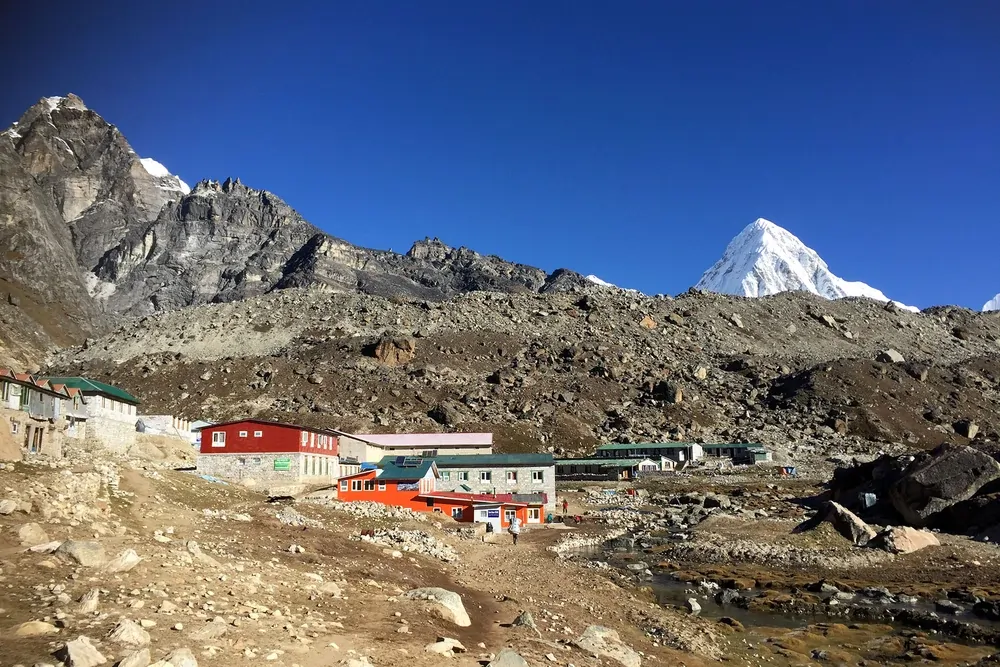 Lobuche
This day begins with a gradual ascend towards Thukla. Here, you will notice a change in scenery as your surrounding starts becoming bare and desolate, with only alpine scrubs surrounding the trail. After some time, the trail becomes somewhat strenuous, with a steep uphill over the moraine of Khumbu Glacier.
Upon climbing the steep ridge, we will arrive at the summit of Thukla Pass. Here, there is an area where you will see many stone shrines dedicated to fallen climbers. Following this pass, we will walk through grassy valleys and rocky terrain to arrive at Lobuche.
This village consists only of teahouses, with no permanent settlements here. It lies in a narrow meadow sandwiched between Lobuche Peak and Khumbu Glacier. You will be able to enjoy the incredible sight of Taboche and Nuptse soaring above the teahouse. In the evening, you may choose to take a short hike to the narrow gap of the moraine and the mountain wall to see the Khumbu Glacier.
Lobuche
This day begins with a gradual ascend towards Thukla. Here, you will notice a change in scenery as your surrounding starts becoming bare and desolate, with only alpine scrubs surrounding the trail. After some time, the trail becomes somewhat strenuous, with a steep uphill over the moraine of Khumbu Glacier.
Upon climbing the steep ridge, we will arrive at the summit of Thukla Pass. Here, there is an area where you will see many stone shrines dedicated to fallen climbers. Following this pass, we will walk through grassy valleys and rocky terrain to arrive at Lobuche.
This village consists only of teahouses, with no permanent settlements here. It lies in a narrow meadow sandwiched between Lobuche Peak and Khumbu Glacier. You will be able to enjoy the incredible sight of Taboche and Nuptse soaring above the teahouse. In the evening, you may choose to take a short hike to the narrow gap of the moraine and the mountain wall to see the Khumbu Glacier. 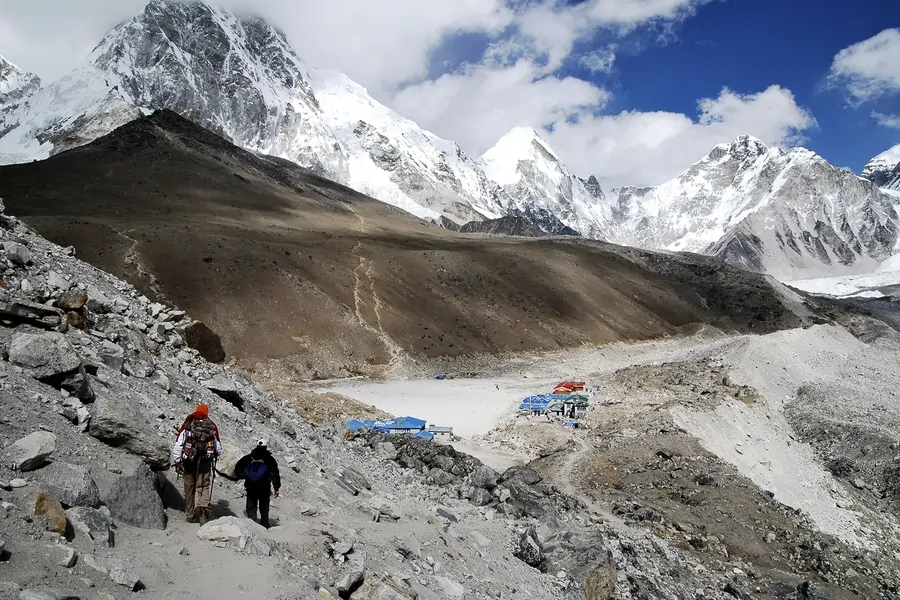 Gorakshep
After having breakfast in Lobuche, we will begin walking on a rough and rocky trail towards Gorak Shep. However, despite the rough trail, you will be able to enjoy views of Nuptse, Pumori, and other mountains. It takes a few hours on this challenging trail before you will arrive in Gorakshep.
We will have a little time to rest and leave your backpack before getting back to walking towards your destination: the Everest Base Camp. Along the way, we will see several small streams and glacial moraines, and you will be walking alongside the Khumbu Glacier. The Khumbu Glacier is similar to a lunar landscape: gray boulders, ice formations, and small craters. It will take about two hours before we will be standing at the foothills of the world’s highest mountain — Mount Everest. Upon reaching Everest Base Camp, you can celebrate your achievement with your trekking guide and team members.
From the base camp, we will have a marvelous sight of Khumbu Icefall, Khumbu Glacier, Nuptse, Pumori, Khumbutse, and a little bit of Everest. After celebrating and enjoying the well-deserved view, we will head back to the barren terrain of Gorakshep for an overnight stay.
Gorakshep
After having breakfast in Lobuche, we will begin walking on a rough and rocky trail towards Gorak Shep. However, despite the rough trail, you will be able to enjoy views of Nuptse, Pumori, and other mountains. It takes a few hours on this challenging trail before you will arrive in Gorakshep.
We will have a little time to rest and leave your backpack before getting back to walking towards your destination: the Everest Base Camp. Along the way, we will see several small streams and glacial moraines, and you will be walking alongside the Khumbu Glacier. The Khumbu Glacier is similar to a lunar landscape: gray boulders, ice formations, and small craters. It will take about two hours before we will be standing at the foothills of the world’s highest mountain — Mount Everest. Upon reaching Everest Base Camp, you can celebrate your achievement with your trekking guide and team members.
From the base camp, we will have a marvelous sight of Khumbu Icefall, Khumbu Glacier, Nuptse, Pumori, Khumbutse, and a little bit of Everest. After celebrating and enjoying the well-deserved view, we will head back to the barren terrain of Gorakshep for an overnight stay. 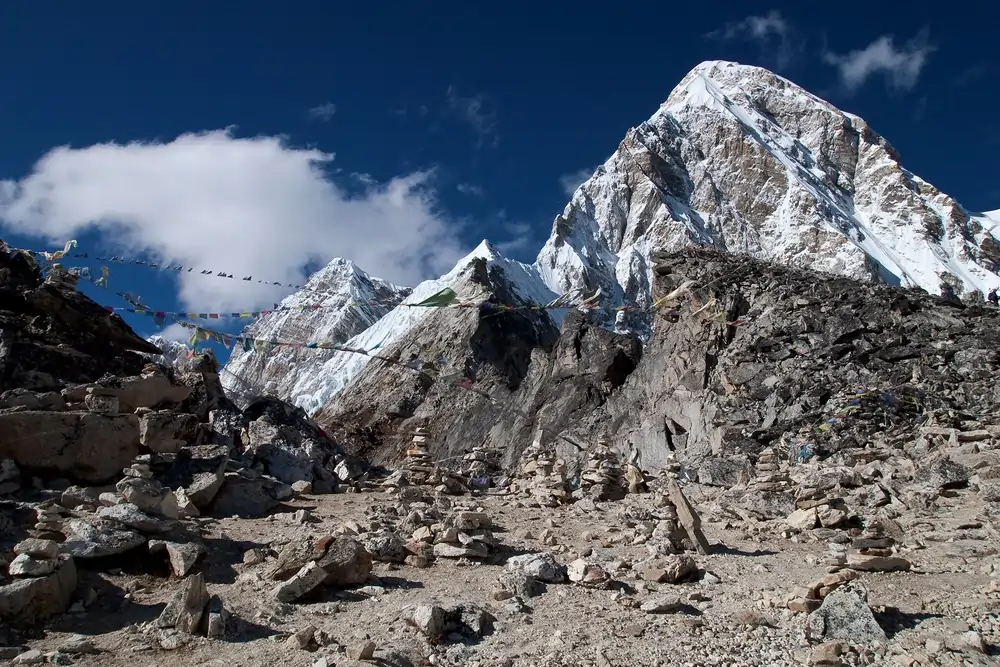 Kalapatthar
The day today starts before sunrise to hike up to the landmark of Kala Patthar. While the trail is not long, it is steep, rocky, and very challenging. Located at 5,545 meters, Kala Patthar is the highest elevation of this trek. From the summit, we will be able to enjoy the sunrise over the Himalayas, with a 360-degree view of the highest peaks in the world including Mt. Everest, Nuptse, Lhotse, and Ama Dablam, Thamserku, Pumori, and more.
After taking in the sunrise, we will retrace your steps back to Gorakshep for breakfast, before descending towards Pheriche. We will walk along the rugged trail and pass through Lobuche and Thukla Pass. Once we descend the ridge of Thukla Pass, we will cross a short bridge over a glacial stream to arrive at Pheriche.
Pheriche is a small settlement surrounded by hotels, teahouses, and yak pastures. It is also home to the Himalayan Rescue Association Clinic. This voluntary non-profit clinic serves as a rescue station for trekkers and mountaineers in the Himalayas.
Kalapatthar
The day today starts before sunrise to hike up to the landmark of Kala Patthar. While the trail is not long, it is steep, rocky, and very challenging. Located at 5,545 meters, Kala Patthar is the highest elevation of this trek. From the summit, we will be able to enjoy the sunrise over the Himalayas, with a 360-degree view of the highest peaks in the world including Mt. Everest, Nuptse, Lhotse, and Ama Dablam, Thamserku, Pumori, and more.
After taking in the sunrise, we will retrace your steps back to Gorakshep for breakfast, before descending towards Pheriche. We will walk along the rugged trail and pass through Lobuche and Thukla Pass. Once we descend the ridge of Thukla Pass, we will cross a short bridge over a glacial stream to arrive at Pheriche.
Pheriche is a small settlement surrounded by hotels, teahouses, and yak pastures. It is also home to the Himalayan Rescue Association Clinic. This voluntary non-profit clinic serves as a rescue station for trekkers and mountaineers in the Himalayas. 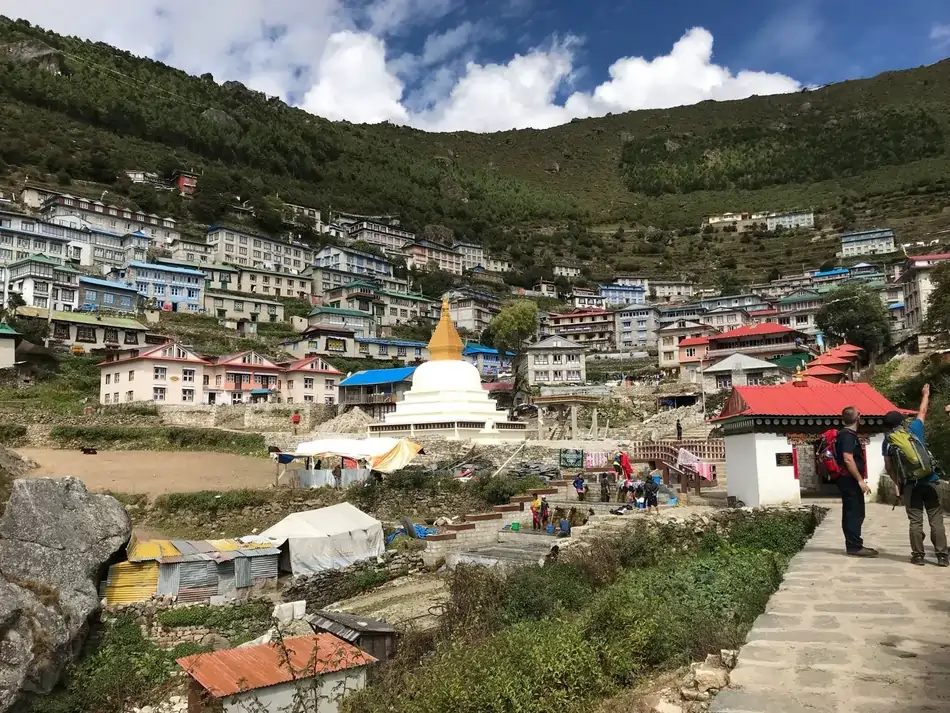 Namche Bazaar
Today, we will be leaving the high Himalayas behind, beginning your walk after breakfast on a more pleasant trail as compared to the last few days. The majority of the day will be spent walking under dense rhododendron and juniper forests.
We may also catch a glimpse of the rare wildlife, including Himalayan griffons, wild goats, musk deer, and pheasants. Along the way, we will pass through several villages, including Tengboche and Phunki Tenga. Once we reach Phunki Tenga, the trail turns into a steep uphill. The ascent takes about an hour before we will walk back down towards the Dudh Koshi River.
Here, we will cross a small suspension bridge to reach Kyangjuma village. This small community is where three popular trails of the Everest region meet — Namche Bazaar, Gokyo Valley, and Khumjung Village. Here, we will follow the trail that leads to Namche Bazaar where we will stay overnight.
Namche Bazaar
Today, we will be leaving the high Himalayas behind, beginning your walk after breakfast on a more pleasant trail as compared to the last few days. The majority of the day will be spent walking under dense rhododendron and juniper forests.
We may also catch a glimpse of the rare wildlife, including Himalayan griffons, wild goats, musk deer, and pheasants. Along the way, we will pass through several villages, including Tengboche and Phunki Tenga. Once we reach Phunki Tenga, the trail turns into a steep uphill. The ascent takes about an hour before we will walk back down towards the Dudh Koshi River.
Here, we will cross a small suspension bridge to reach Kyangjuma village. This small community is where three popular trails of the Everest region meet — Namche Bazaar, Gokyo Valley, and Khumjung Village. Here, we will follow the trail that leads to Namche Bazaar where we will stay overnight. 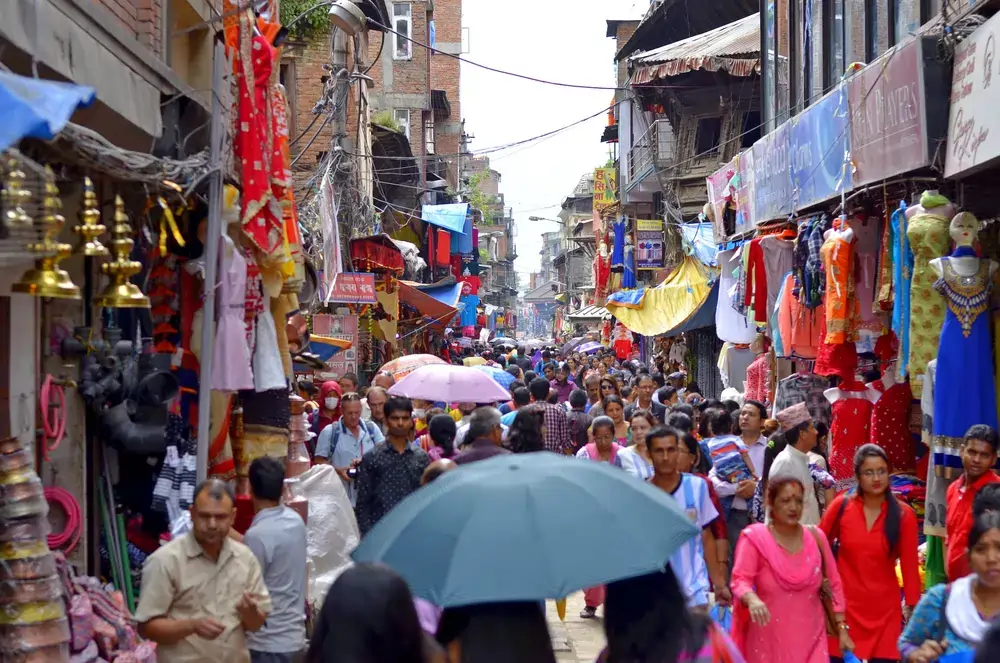 Kathmandu
This is the final day of 0ur trek. Early in the morning, while the weather is good, we will board a flight back to Kathmandu. Make sure to enjoy one last view of the incredible region as you fly to the city. After a short 30-minute flight, we will arrive in Kathmandu where we will transferr you back to your hotel.
You are then free to rest or wander around Thamel to purchase souvenirs for your friends and family back home. There are also plenty of restaurants to choose from in this part of the city, serving everything from local to international cuisines. After your time in the mountains, you will be sure to find something to enjoy for dinner. If you have extra days to spare, we can recommend you to other tours and activities too!
Kathmandu
This is the final day of 0ur trek. Early in the morning, while the weather is good, we will board a flight back to Kathmandu. Make sure to enjoy one last view of the incredible region as you fly to the city. After a short 30-minute flight, we will arrive in Kathmandu where we will transferr you back to your hotel.
You are then free to rest or wander around Thamel to purchase souvenirs for your friends and family back home. There are also plenty of restaurants to choose from in this part of the city, serving everything from local to international cuisines. After your time in the mountains, you will be sure to find something to enjoy for dinner. If you have extra days to spare, we can recommend you to other tours and activities too! Services
Services Included in the Package
- Pickup/drop off from airport
- Transportation via Tourist coach bus or Jeep
- A professional guide
- Accommodation in twin sharing basis (Extra fares for private accommodations)
- Daily breakfast package during trip
- A trek map
- First aid kit and Emergency evacuation arrangements
- Government taxes
- Round trip flight costs for guide
- Domestic flight costs to Lukla
- Service charges and fees
- Necessary Conservation permits
- Equipment and Insurance for guide
- Accommodation, meals & daily allowance for guide
Services Excluded in the Package
- All lunch and dinner meals during trek
- All drinks (Hot/cold/bottled) during the trek
- Recharge cost of electronic devices during the trek
- Hot shower cost
- Personal expenses
- Travel/ Medical Insurance
- Emergency evacuation cost
More Info
Risk and Liability
We endeavor to always make your experience smooth and pleasant. However, the EBC trek involves trekking along steep mountain ranges in harsh physical and environmental conditions. Hence there is always a risk.
Therefore, Adventure Speed shall not be responsible for any changes in the itineraries due to unavoidable circumstances and natural disasters such as landslide, road blockage, flood, snowing, cancellation of flight and delay, or any type of sickness including altitude sickness.
What to Expect:
The Everest Base Camp trek is a challenging trek that requires prior trekking/hiking experience. During the course of the trek, we will trek on an average of 6 hours per day on moderate to steep grades, at varied elevations.
We will also take some “rest days” with optional hikes to properly acclimatize. Your Trek guide will set a suitable pace to minimize the risk of altitude issues, and porters will transport your gear for you. Please tell us in advance if you are under medication or under the supervision of doctors.
Alternative routes to this area
The Everest Area trekking offers several routes. One can trek from a week to multiple weeks in the Everest region. Some popular trekking routes are the Everest Base camp trek, Gokyo lake/Gokyo Ri trek, Everest Base camp trek and Gokyo Lake via Chola, Everest Three Passes trek. You can combine the trip with peak climbing as well. We can also customize your trip according to your time availability, budget and interest.
Flight Delays to Lukla
The weather in Lukla is highly unpredictable. The small airstrip, located on top of a hill with mountains surrounding it is widely known for its terrible weather, which impacts flight schedules frequently. The flights, in such circumstances may likely be delayed or even canceled in worst cases.
In peak season, flights to Lukla are operated from Ramechhap instead of Kathmandu. In this case, we need to drive to Ramechhap a day earlier to check in for an early flight to Lukla because it is a 4 to 5 hour drive to Ramechhap from Kathmandu.
Guide & Permit
Our guides are skilled and experienced for even the harshest situations. We provide you with Sherpa guides from the Everest region for the trek as they are more familiar with the geography, culture and people in that region.
Our staffs are insured, well equipped and well paid. For Everest, TIMS (Trekkers Information Management System) and National Park permits are required, which is applied through registered trekking agencies like “Adventure Speed.”
Accommodation and Food
Generally, we stay in Trekkers lodges/guest houses that facilitate a twin bedroom with shared bath/toilet. Sometime room with private bath also available. In Some places, luxurious resort and hotel are available. If you want to experience Himalayan luxury stay you can pay additional and stay. Regarding the food we recommend you try the local food that the lodges provide since they are cooked perfectly and are nutritious.
Note: To get to these areas, meat products must be flown in, transported by porters, or brought on the backs of yaks and donkeys. For this reason, at least above Namche Bazaar, don’t expect meat and meat products to be fresh. To prevent getting sick on the trek, we advise all of our clients to avoid eating meat. And keep in mind that the higher you go, the more expensive meat products become! Rather, it is a wise move to bring your own canned meat from Namche Bazaar.
Pickup from airport during arrival
Our team offers the service of picking you up from the international airport in Kathmandu when you arrive in Nepal after you have booked your trip with us. Our team will contact you via email, phone or text after your booking, and after sharing details, our team will pick you up at the airport and transfer you to your hotel upon arrival.
Trek Site Map
FAQs
Everest Base Camp Trek is a relatively expensive trek. The trek requires flying in and out in a domestic plane which already costs you a few hundred dollars. Moreover, the trek takes place in the remote mountains, so basic items like groceries and other goods, should be exported like soap, snacks, etc. need to be exported from other cities. This makes them cost much more than their usual price. So in short, it is an expensive trek but truth be told, the trek is worth every penny.
In short, Everest Base Camp Trek requires a lot of preparation and there is no fixed cost for the trek because it varies according to the trekking companies. Likewise, make sure what is offered and not offered at the given price.
Travel insurance is costly, but it is extremely necessary. Many clients ask us, “Why should we purchase travel insurance?” And as experts, we should inform you that a travel insurance is necessary for treks in Everest Base Camp and generally most of the Himalayas, as it covers extra expenses incurred during the trek (Emergency helicopter evacuation in case you get mountain sickness and also the cancellation charge if you are unable to trek on the planned date.) But remember that you have to have valid reasons to claim the insurance.
Furthermore, without a travel insurance, you are not eligible to do the EBC trek. It is a necessary document when trekking in Nepal. Also please note that when you are purchasing your travel insurance, make sure it covers an altitude clearance of upto 6000m.
Walking for a long period of time at high altitudes carrying heavy loads is not an easy task to do. But it is completely attainable with prior training and exercise. Unlike other trekking routes of Nepal, Everest Base Camp trek already begins from a high altitude of 2850m/9350ft above sea level. Thus, it is very necessary to be able to cope with the elevation gain. You will also need to reach up to an elevation of 5632m/18477 feet (Everest Base Camp) which is very high. That is why we do not recommend EBC to amateur trekkers.
All in all, physical fitness is very important to be able to do the Everest Base Camp trek. Some articles might say the EBC trek is easy, but we suggest you not blindly follow them. If you meet someone who has done the Everest Base Camp trek, make sure you receive some exercise tips from them. Before opting for the trek, you need to mainly check your age and fitness.
EBC trek is one of the popular trekking destinations in Nepal. You can hence have options of luxury while on some parts of the trek. Luxury Mountain lodges are available in Lukla, Phakding, and Namche, which come with attached bathrooms with hot running water all the time, with other amenities. But primarily, at higher altitudes, we do not have hotels, we have teahouses, lodges, and guesthouses. But these accommodations provide you with the same services as hotels, and they are considered even more hospitable.
If you are a fit and avid trekker, you can complete the trek in less than 12 days which is the standard number of days to complete the trek. However, reducing the number below 12 days is not advisable because when you suddenly gain great altitude then it will impact your health and causes altitude sickness which can lead to a life-threatening situation. Also, to be able to finish the trek in 12 days, trekkers should be able to walk for 5 to 6 hours daily. However, the recommended days for the Everest Base Camp trek is 16 days. In 16 days, one can properly acclimatize and complete the trek smoothly.
This is one of the most frequently asked question from our visitors. Trekkers can purchase hot/cold water at teahouses found along the way after paying some fees. Also, another alternative to get water on the EBC trail is to bring your own water sterilizing tablet and bottle. Fill the water bottle from springs or public taps found along trails and use the purification tablets to sterilize the water.
You can get all sorts of food while on the trek. You will find some of the cutest cafes and restaurants along your trek. Teahouses provide a menu to its guests where you can find a variety of local and foreign cuisines.
Also. if you have any dietary restrictions like vegan foods and gluten-free meals, then you need not worry because the teahouses will prepare food according to your preference. Nonetheless, we suggest all the trekkers “to be veg” during the trek to avoid indigestion/food poisoning, as it is quite difficult to digest non-veg meals when you are at higher altitudes.
The weight limit for Lukla flight is 15 kg per person including the handbag. So we shall ask you to pack the bags very carefully and effectively only with the necessary things.
As per the statistics, the EBC is most visited during spring and autumn season and is least visited during summer/monsoon season and winter season due to obvious reasons. But it all depends on people and their preferences as each season provides a whole new outlook to the surroundings leading to the trek.
For instance, during the spring season (March-May), the trek will be done it a clear and moderate weather, so it may be the best time to do the trek. Likewise, the autumn season (September- November) is also a good time because you will be greeted with stunning mountain views.
However, if you want to avoid the crowd and do not mind the monsoon weather and mushy trail and frequent encounter with the leeches, then summer might also be ideal for you to do the EBC trek. Similarly, if you have a high resistance told cold and love the snow, then winter season might be for you.
For beginners viewing the EBC trek as the beginning of a moderate/strenuous trek though, we recommend doing the trek during the spring and autumn season for the best experience.
Trekking is all about having the right kinds of gears, equipment and clothes necessary for trekking. And while packing one should also consider the season in which they are undertaking the trek, as one should pack according to the weather conditions.
For clothing, trekking pants, hiking shorts, a down jacket, thermal socks, lots of underwear, hiking boots, camp shoes and sweatshirts are amongst the basic necessities. For your trekking gear, a resilient bag for carrying gear via porters, a trekking bag for you to carry (40L), trekking towels, water filters, trekking poles and sunglasses are recommended.
Please click the given link for the list of trekking equipment required for your trek to Everest Base Camp
For flights to operate, the weather needs to be clear. Until and unless the weather is clear, the airline does not operate its flights. As the weather in Lukla is unpredictable, if the flights get delayed or cancelled, there are other alternatives. For instance, you can take a helicopter to Lukla on a sharing basis by making an extra payment. That is why we suggest our clients to always put an extra day in their trekking timeline if possible.
Yes. You can charge your electronic devices during the Everest Base Camp trek. You can easily find electricity on most of the lower parts of the trek. But as you move higher, electricity is supplied through solar panels, so you may not always have access to electricity. That is why when you reach higher altitudes, expect to pay a small amount of fee per hour to charge your electrical devices.
You can get good cell reception and internet services while on the trek. We hence recommend trekkers to purchase Nepalese Sim cards to make calls. There are also good WIFI facilities across the Everest base camp trail thus you can get in touch with your family every day. However, to use internet services, you may have to pay extra fees.
We can arrange private rooms for you in Kathmandu. During the trek, it may be possible to get private rooms without extra cost in some villages, and we always do our best to arrange it for our clients. However, during trekking season (Spring/Autumn) there is a great influx of trekkers. And as there is a limited amount of lodging available in some of the villages, it is generally impossible to arrange private rooms.
This is the case even if you’re willing to pay extra since the tea house owners will not give out private rooms if it means someone else goes without a room.
Yes we have regular group departure. Please join our group.
